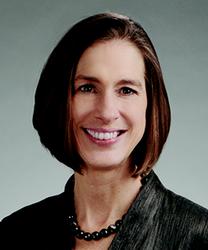
From the perspective of both the hiring institution and the candidate, there can be many misconceptions about search firms’ involvement in the recruitment process. In this month’s Higher Ed Careers interview Andrew Hibel speaks with Jennifer Desjarlais, executive search consultant for Witt/Kieffer about the truths and myths behind search firms.
Andrew Hibel, HigherEdJobs: Jennifer, you recently worked in academia in a senior staff position and now are an executive search consultant for Witt/Kieffer’s Higher Education Practice. How do you utilize your background when you are performing executive searches for clients?
Jennifer Desjarlais, Witt/Kieffer: I worked in higher education for close to thirty years and almost half of that time I was a member of a senior leadership team, so I’ve been on the other side of the table. I’m attuned to the nuances of institutional culture and to the specific experiences and dynamics of institutional leadership within the context of a changing external landscape. I’ve been part of a lot of search committees and recruitments. I think that allows me to understand the strategic and leadership challenges our clients face. It gives me credibility. It allows me to ask tough questions, even before we begin recruiting candidates: Is this position, as currently defined, really set up to succeed? Can we attract top candidates at this salary level? Are you prepared to hire someone who does not necessarily fit the mold of past leaders? When I ask these questions and offer candid advice, clients know I’ve experienced these issues before prior to my search career.
Most importantly, I think my experience has afforded me a specific lens through which to view the impact of excellent leadership on an organization’s attainment of its goals and mission. I have seen initiatives fail when the leadership just wasn’t there; conversely, I’ve seen great successes when presidents or student affairs officers and advancement officers were exceptional and knew how to get things done with those around them. I know from my experience, for example, that great leaders are not siloed in their work or approach, but rather open to each individual team member bringing her or his expertise to bear in collaborative and transparent decision-making. My background lets me see strong leaders as well as know how they’ll do in a given academic setting.
Hibel: From the university perspective, what are the advantages of using a search firm?
Desjarlais: At the leadership level, competition for top candidates is intense. Search consultants bring industry expertise and can identify and engage excellent candidates in a way that search committees might not be able to. We often are hired in situations in which the committee has tried, but not succeeded, to recruit on its own. This is not a criticism of that committee, only an acknowledgment of just how hard it is today to conduct a leadership search given members’ time constraints, campus politics, and so forth.
So we aim to shepherd a good process. We also encourage the committee to be bold and creative in their thinking as well. What is a truly great leader for this job? Can we push the boundaries of candidates, maybe even outside of higher education? We are in a position to guide the committee’s thinking more expansively toward the institution’s future and not focus solely on a present concern or need.
Finally, a search firm works in partnership with each client to identify, assess, and select a candidate who is fully aligned with the institution’s values and strategic priorities. With that in mind, there are significant collateral benefits to using a search firm. In our work with a client, we will offer an informed assessment of the opportunity to candidates on their behalf as well as provide constructive market intelligence for the client. In short, we’re able to mitigate the risk of hiring the wrong person and increase the likelihood of getting the right person in a given position.
Hibel: The Witt/Kieffer site states, “Our search teams use a customized approach to assess organizational dynamics, leadership goals, and the competitive landscape specific to each organization.” Specifically, what are some tactics Witt/Kieffer employs to achieve these assessments and find talent to match the role?
Desjarlais: Our approach is to understand the client’s specific need right from the start and throughout a search. We spend significant time with organizational leaders and key stakeholders at the outset and take a deep dive into organizational culture, priorities, challenges, and opportunities. This involves in-person meetings with individuals and groups, surveying critical constituents, and listening intently to their observations and opinions. From there, we craft a leadership profile that is a distillation of what we have learned through this assessment and additional research, and is specifically tailored to the opportunity and institutional context. This allows us to encourage top candidates to see themselves in this particular role at this institution – a candidate who’s perfect for the chief enrollment officer, chief financial officer, or president at one institution might not be a good fit at another.
As former institutional leaders ourselves, we utilize our networks and research capabilities within particular areas of the industry (e.g., enrollment, academic leadership, presidencies, etc.) to identify candidates who would bring the particular leadership qualities and experiences the institution seeks. Given what we know about the opportunity or particular culture, we will encourage a committee to consider candidates who may be a bit “outside the box.”
Finally, we offer modern psychometric assessment methodologies (such as through a partnership we have with Hogan Assessment Systems) to provide additional qualitative and quantitative information to support a search committee’s decisions. Will a candidate align with this campus culture? How does the person make decisions under stress? Is she collaborative? Are there “derailers” which could inhibit her success in the job? We can learn so much more about candidates than in the past that inform the hiring decision. (Allow me to recommend ” The Case for Leadership Assessment in Higher Ed” by my colleague Lucy Leske.)
Hibel: From a client or university perspective, what are the top misconceptions about search firms and what are the truths behind these false beliefs?
Desjarlais: There are certainly some misconceptions. One myth has to do with the nature of retained vs. contingency search. My firm, like most of our competitors in higher education, is a retained search firm. We are hired by the client up front to identify the best possible candidates and to ensure the search process is comprehensive, fair, and ultimately, finds the right person for that particular position and institution. As such, our first obligation is to the client institution and its leadership needs. It is not in our interest at all to push for a hire to be done hastily or to put forth a candidate if he or she is not well qualified for the position and the culture of the institution we represent. It is fair to say that we succeed when our clients succeed.
One other myth that sometimes arises is that people assume that the search committee relinquishes some of its responsibility and authority to the search firm. Certainly, our job is to do a lot of the leg work of recruiting for the committee, but it is also to make the committee more effective and efficient in its work, to counsel it and shepherd the process so that the committee can carry out its charge and truly exercise its authority. In a shared governance environment, one part of that charge is to represent various key constituencies on campus. Search firms make committees better able to do this.
Hibel: What about from the job seeker/candidate perspective–what are the top myths you think exist regarding search firms and what are their truths?
Desjarlais: A couple things come to mind. Related to the above, we work first and foremost for our clients to help them find exceptional leaders. Our obligation to candidates is to counsel them and be open and honest about whether they fit with what the search committee and institution are seeking. If not, we provide advice to candidates on their careers and how they can position themselves for other opportunities in the future.
Some candidates think that they should not approach search consultants until they’re ready to make a move. On the contrary, it’s good to stay in touch with consultants every so often. From a candidate perspective, the best opportunities arise at unpredictable times. Part of my job is to build long-term relationships with the best leaders in higher ed regardless of whether they are “active” or “passive” candidates.
Hibel: In an article in your Thought Leadership series, advice was given to potential candidates to remain open to new opportunities, but not to risk their reputations by pursuing positions for which there is no genuine interest. What other advice do you have for passive job seekers who may be just “dipping their toe” in the pool to explore opportunities?
Desjarlais: I agree that remaining open is important, and staying connected to your networks is also critical. You really never know when an interesting opportunity is going to present itself and you may hear about something from a colleague or at a professional meeting that could be the next right thing for you. In my experience, great opportunities tend to come along when you least expect them to, but often from someone you know and trust. When something comes to your attention from a colleague who can see you and your talents in a particular role, take the time to learn more about it and use it as a chance for some professional feedback and self-reflection.
Hibel: In a recent article, consultant Joyce De Leo recommends candidates do extensive research and “deep dive” before accepting a new position. Do you have other suggestions for a candidate who is in a search?
Desjarlais: The importance of self evaluation cannot be underestimated. The same kind of “deep dive” approach applies to fully understanding your own motivation and goals for pursuing a particular position and feeling confident that they align with the mission, priorities, and expectations of the organization. Do you have a very good sense not only of what you can contribute, but also how your contributions and success will be measured? Do you fully understand the opportunities and challenges ahead? Are you fully ready to embrace this next step and these new challenges?
Conversely, I would also advise candidates to accept and embrace a reasonable element of risk; that is to say, if you are open to a certain amount of ambiguity that comes with any new opportunity and change, enter with your eyes wide open and the confidence to affect change.
